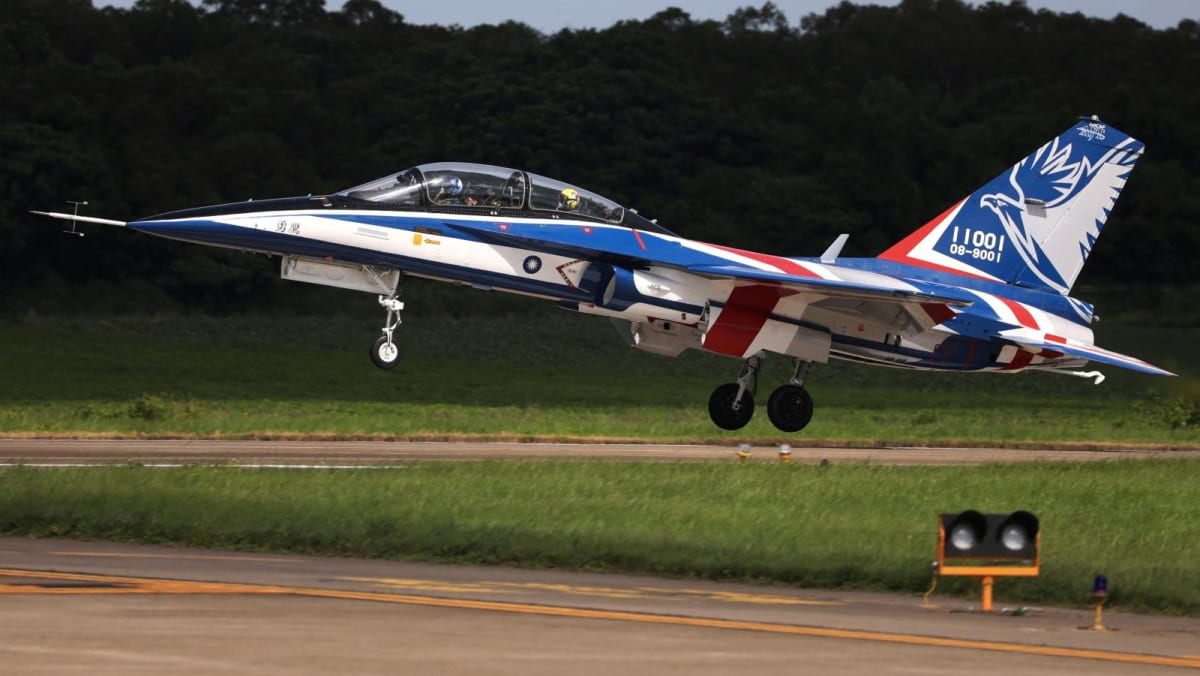Asia
Advanced new Taiwan jet trainer crashes in setback for programme

Taiwan’s Domestic Jet Trainer Program Faces Setback After AT-5 Brave Eagle Crash
Introduction to the Incident
On Saturday, February 15, Taiwan’s air force experienced a significant setback when one of its newly developed advanced jet trainer aircraft, the AT-5 Brave Eagle, crashed following a reported engine failure. Fortunately, the crew on board managed to eject safely and were rescued, according to the military. The incident marks the first major accident involving the AT-5 since its introduction to the air force in 2021. This event has cast a shadow over the ambitious program, which is central to Taiwan’s efforts to modernize its military capabilities and reduce reliance on foreign-made aircraft.
The AT-5 Brave Eagle: A Key Component of Taiwan’s Defense Modernization
The AT-5 Brave Eagle is a domestically developed advanced jet trainer aircraft manufactured by the state-owned Aerospace Industrial Development Corp (AIDC). The program, which was allocated a budget of TW$68.6 billion (approximately US$2.1 billion), is part of Taiwan’s broader strategy to strengthen its homegrown defense industry. The AT-5 conducted its maiden test flight in 2020 and was officially handed over to the air force in 2021. Designed to replace the aging AT-3 and U.S.-made F-5 training aircraft, the AT-5 is intended to serve as a dual-purpose trainer for both air-to-air and air-to-ground combat training. With its ability to operate on shorter runways and its potential to be equipped with weapons, the aircraft is seen as a vital asset for Taiwan’s military training and readiness.
Details of the Crash and Its Implications
The ill-fated flight took off from Chihhang Air Base in Taitung, located on the eastern coast of Taiwan. Shortly after takeoff, the aircraft reported a failure in both engines, leading to the crew’s decision to eject. The successful rescue of the crew has been greeted with relief, but the crash has raised concerns about the reliability and safety of the AT-5. An investigation team has been established to determine the cause of the engine failure, with the military promising a thorough review of the incident. This is the first such accident since the AT-5 began being phased into service, and it comes at a critical time for Taiwan’s defense modernization efforts.
Strategic Importance of the AT-5 Program
The AT-5 Brave Eagle is not only a symbol of Taiwan’s indigenous defense capabilities but also a crucial component of its military strategy. The aircraft is designed to address the shortcomings of its predecessors, including the AT-3 and F-5, which have been plagued by a series of accidents in recent years. The Taiwanese air force plans to acquire 66 units of the AT-5 by 2026, with the goal of enhancing its training capabilities and preparing pilots for the demands of modern combat. The aircraft’s ability to simulate advanced combat scenarios and its shorter runway requirements make it particularly valuable for Taiwan’s geopolitical landscape.
The Broader Context of Taiwan’s Defense Strategy
While Taiwan’s armed forces are predominantly equipped with U.S.-made hardware, the island’s government has prioritized the development of a self-sufficient defense industry. This shift is driven by the increasing assertiveness of China, which claims Taiwan as its own and has intensified military drills and modernization efforts in the region. The development of the AT-5 Brave Eagle is a testament to Taiwan’s efforts to reduce its reliance on foreign suppliers while building a cutting-edge military capability. The success of this program is seen as essential for maintaining Taiwan’s defense sovereignty in the face of growing regional tensions.
The Road Ahead for the AT-5 Program
Despite the setback caused by the recent crash, the AT-5 Brave Eagle remains a cornerstone of Taiwan’s defense strategy. The incident serves as a reminder of the challenges inherent in developing advanced military hardware, particularly for a country with limited resources and geopolitical pressures. As the investigation into the crash unfolds, the focus will be on identifying the root cause of the engine failure and implementing measures to prevent similar incidents in the future. The successful continuation of the AT-5 program will not only enhance Taiwan’s military capabilities but also demonstrate its commitment to self-reliance in defense. Whether the program can overcome this hurdle and achieve its full potential remains to be seen, but its importance to Taiwan’s future cannot be overstated.











